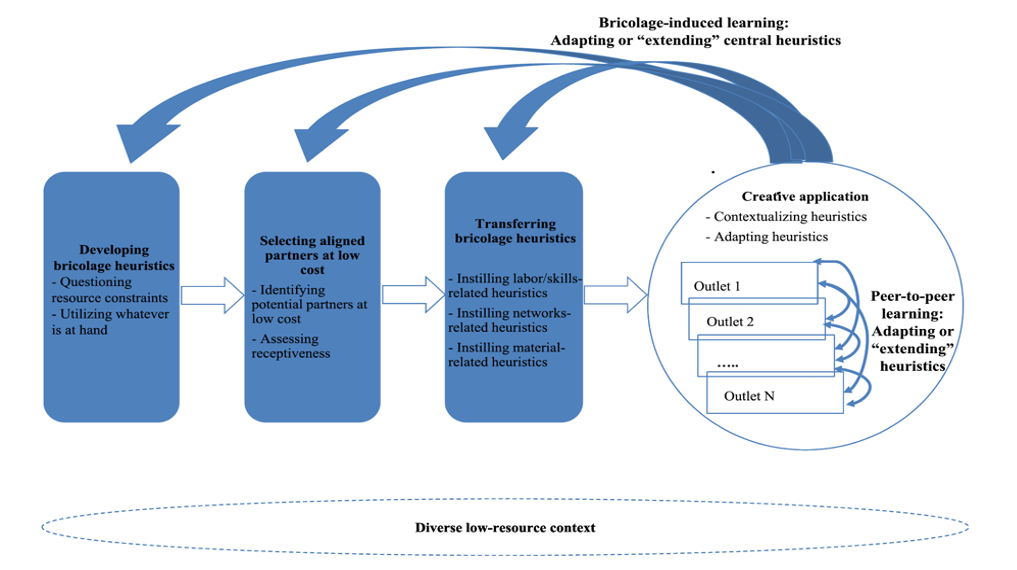
How do organisations emerge, survive, and scale in resource-scarce environments? Traditional scaling models tend to rely on considerable financial resources and companies often struggle to adjust to diverse contexts. In contrast, we identified and studied a (social) enterprise in Sub-Saharan Africa that used simple rules to scale bricolage – making the best out of what is at hand – successfully in diverse low-resource contexts. Our six-year longitudinal study of this organisation provides a novel conceptual model of scaling bricolage: as a low-cost replication process of heuristics, enabling fit with a diversity of local environments, as well as cross-unit innovation and learning.
How organisations survive and scale in resource-scarce environments
Enterprises operating under extreme scarcity constraints often achieve their objectives by making the best out of what is at hand. This “bricolage” approach enables enterprises to not only access the resources necessary to develop successfully, but also to unearth new ways of addressing unmet needs at low cost. Traditionally, the bricolage approach has been regarded as a temporary method for newly emerging enterprises, as well as for multinational companies exploring new, low resource markets on a limited budget. However, previous research has suggested that, if continued over time, bricolage will adversely affect company growth and performance. This is due to a number of factors, such as spreading resources and managerial efforts too thin, and the inability to advance and scale learning capabilities.
Can bricolage be scaled, and if so, how and why?
We studied a social organisation, Community Org (CO; name changed), located in Bridgetown, one of the low-income townships in the Cape Flats, in Cape Town (South Africa). Surprisingly, we found in our qualitative research that CO had, out of necessity, successfully scaled by utilising bricolage. In our inductive case study, we unpacked how CO addressed poverty challenges at scale in these and other townships through its IT-training and education programs. By 2018, it had scaled to 20 locations worldwide, while sustaining its bricolage approach.
Our findings show that CO developed a simple and effective set of rules (heuristics) from its operations at home that guided the identification, selection, and implementation of local opportunities to address poverty, and then transferred these simple rules to other locations, while contextualising them. CO replicated its approach as part of an overall low-cost scaling strategy, and adapted and innovated on a local and organisational level. Instead of looking for specific, new resources to sustain its operations and growth, as mainstream management theory suggests and larger organisations typically practice, it developed the capability to make the best out of what was at hand, at low cost and at scale. The development of simple (non-specific) rules enabled it to easily adapt to a diversity of local circumstances.
In other words, starting with an initial template, CO used heuristics – simple and broad rules of thumb – enabling creative application in other local settings. In turn, this triggered continuous learning beyond the focal hub, further diffused by CO using unit-to-unit and unit-to-centre interactions – improving performance over time.
Figure 1. Scaling bricolage

Scaling bricolage as a low-cost replication process of heuristics
Based on our findings, we identified a process model of how organisations may successfully scale bricolage through replication, by developing and transferring heuristics in a low cost way. Our conceptual model shows how CO developed a set of simple heuristics that served as a “template”, and then began identifying and selecting partners across the African continent and globally at low cost, using “rules of thumb” to determine which partners to target and to select. Once a suitable partner was found, CO embarked on transferring bricolage heuristics, encouraging partners to creatively use discarded materials, unemployed people, overcoming traditionally perceived resource limitations when choosing local opportunities. Training and supporting local hubs on how local opportunities could be captured effectively at low or zero cost, while leaving space for local contextualisation and innovation.
These findings contribute to our understanding of how (social) enterprises can scale up. As our process model shows, bricolage heuristics can be replicated – while adapted to a variety of settings and enabling learning at the local and organisational levels – at low costs. Hence, resource-constrained social organisations following this process approach may successfully overcome traditionally observed barriers to scaling.
More generally, social organisations may be seen as an interesting “extreme” case, where our insights may also apply to other organisations aiming to innovate and scale at low costs across a variety of contexts. By showing how innovation-enhancing bricolage can be replicated at scale across a diversity of resource-constrained contexts, we enhanced our collective understanding of how low-cost innovation can be scaled across settings, transcending locally disconnected initiatives and benefits – and overcoming the traditional “replication dilemma” (of standardisation vs localisation).
Authors’ note: We thank Rayme Silverberg for great editorial support.
♣♣♣
Notes:
- This blog post is based on From necessity to opportunity: Scaling bricolage across resource‐constrained environments, Strategic Management Journal.
- The post expresses the views of its author(s), not the position of LSE Business Review or the London School of Economics.
- Featured image by Riccardo Annandale on Unsplash
- When you leave a comment, you’re agreeing to our Comment Policy.
 Christian Busch is an assistant professor at New York University (NYU), where he directs the CGA Global Economy Program, as well as a visiting fellow at the LSE’s Marshall Institute. His research focuses on alternative growth strategies, purpose-driven leadership, impact entrepreneurship, and social innovation. He is the co-founder of Leaders on Purpose and the Sandbox Network, and previously served as deputy director at the LSE’s Innovation and Co-Creation Lab. His new book – The Serendipity Mindset (Penguin Random House) – focuses on how to turn uncertainty into positive outcomes. Twitter: @ChrisSerendip.
Christian Busch is an assistant professor at New York University (NYU), where he directs the CGA Global Economy Program, as well as a visiting fellow at the LSE’s Marshall Institute. His research focuses on alternative growth strategies, purpose-driven leadership, impact entrepreneurship, and social innovation. He is the co-founder of Leaders on Purpose and the Sandbox Network, and previously served as deputy director at the LSE’s Innovation and Co-Creation Lab. His new book – The Serendipity Mindset (Penguin Random House) – focuses on how to turn uncertainty into positive outcomes. Twitter: @ChrisSerendip.
 Harry Barkema is a professor of management at LSE, and founding director of LSE’s Master’s program of Social Innovation and Entrepreneurship, and of the LSE’s Innovation Co-Creation Lab (ICCL) for social entrepreneurship. His current research interests lie in the field of learning and pivoting, growth and scaling of (social) enterprises, social networks, social and economic dependencies of frontline workers and their incentives to help others, and how this influences individual (eudaemonic) well-being and an organisation’s social impact, in South Asia (India and Bangladesh) and Africa (Nigeria, Kenya, and South Africa).
Harry Barkema is a professor of management at LSE, and founding director of LSE’s Master’s program of Social Innovation and Entrepreneurship, and of the LSE’s Innovation Co-Creation Lab (ICCL) for social entrepreneurship. His current research interests lie in the field of learning and pivoting, growth and scaling of (social) enterprises, social networks, social and economic dependencies of frontline workers and their incentives to help others, and how this influences individual (eudaemonic) well-being and an organisation’s social impact, in South Asia (India and Bangladesh) and Africa (Nigeria, Kenya, and South Africa).





